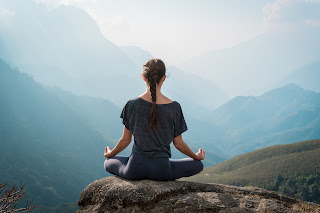"Meditation for Beginners: A Simple Guide to Finding Inner Peace"
1. Find a Quiet Place
The first step to meditating is finding a quiet place where you can be alone and free from distractions. It could be a room in your house, a park, or anywhere else that makes you feel comfortable and peaceful.
2. Get Comfortable
Once you've found your meditation spot, it's time to get comfortable. Sit cross-legged on the floor, on a cushion, or in a chair with your back straight and your hands resting on your lap. You want to be in a position that is comfortable but also allows you to be alert and focused.
3. Focus on Your Breath
Close your eyes and begin to focus on your breath. Take a few deep breaths in and out, and then settle into a natural rhythm of breathing. As you inhale, imagine that you're breathing in peace and calmness. As you exhale, imagine that you're releasing stress and tension.
4. Observe Your Thoughts
As you continue to focus on your breath, you'll notice that thoughts begin to pop into your head. This is completely normal, and it's okay. Instead of getting caught up in your thoughts, observe them as they come and go. Imagine that your thoughts are clouds passing through the sky. Acknowledge them, but don't get attached to them.
5. Stay Present
The goal of meditation is to stay present and in the moment. Whenever you notice that your mind has wandered, gently bring your attention back to your breath. Don't judge yourself or get frustrated if your mind wanders. Just keep bringing your attention back to your breath.
6. Set a Time Limit
When you first start meditating, it's a good idea to set a time limit. Start with just a few minutes and gradually work your way up to longer sessions. You don't want to meditate for too long at first, as it can be difficult to stay focused for extended periods.
7. Be Consistent
The key to getting the most out of meditation is consistency. Aim to meditate for a few minutes each day, even if it's just five minutes. As you get more comfortable with the practice, you can increase the amount of time you spend meditating.
In conclusion, meditation is a simple practice that can have a profound impact on your life. By finding a quiet place, getting comfortable, focusing on your breath, observing your thoughts, staying present, setting a time limit, and being consistent, you can start to experience the benefits of meditation. So, take a deep breath, close your eyes, and give it a try!




Comments
Post a Comment